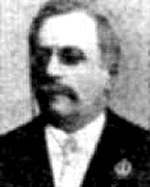Mark Warshawsky, Date of Birth, Place of Birth, Date of Death
TweetMark Warshawsky
Jewish poet
 Date of Birth: 26-Nov-1848
Date of Birth: 26-Nov-1848
 Place of Birth: Odessa, Odessa Oblast, Ukraine
Place of Birth: Odessa, Odessa Oblast, Ukraine
Date of Death: 26-Nov-1907
Profession: composer, lawyer, poet, singer, singer-songwriter, lyricist
Zodiac Sign: Sagittarius 
About Mark Warshawsky
- Mark Markovich Warshawsky (Varshavsky) (Russian: ???? ???????? ??????????, Yiddish: ????? ??????????????; 26 November 1848 – 1907) was a Yiddish-language folk poet and composer.Born in Odessa into an Ashkenazi Jewish family, he moved with his family as a child to Zhitomir, where he later attended the four-year state rabbinical school.
- After that he studied law at Odessa University for one year, then completed his studies at Kiev University, and went on to practice law in Kiev.
- He practiced law throughout his life, barely managing to make a living.
- In 1903 he moved to Belgium to work as a legal adviser for a firm there; upon falling ill in 1905, he returned to Kiev, where he died two years later.By the influence of Abraham Goldfaden Warshawsky started to write songs and sing them in his circle of friends accompanied by a fortepiano.
- He did not take seriously his musical work and never recorded those songs, relying on his memory.
- Many of his works in this way were spread throughout the Jewish community of the Ukrainian region of the Russian Empire and most of them were simply adopted as folk songs. In 1890 Warshawsky met with Sholem Aleichem.
- After listening to his songs, Sholem Aleichem wrote "I simply hugged him and kissed him!" And then, Later, by Aleichem's full cooperation, Warshawsky published his first collection, Yiddishe Volkslider (Jewish People's songs, Kiev, 1900) with a heartily foreword from the great classic.
- That book was republished not only in Russia, but abroad as well.
- The collection included such songs as Der Alef-Beis (commonly known as Oyfn Pripetshik), A Brif fun Amerike, Der Zeide mit der Babe.
- The songs described the everyday life of Jews in the Russian Empire. Together Sholem Aleichem and Warshawsky started to tour around Russia performing their own repertoire.
- They also had plans to travel to the United States, however, those plans were left unfulfilled as Warshawsky suddenly became ill and died on November 26.
- The second edition of the Warshawsky's songs was published in Odessa in 1914, with the following exclusively abroad: New York (1948) and Buenos-Aires (1958). According to Prilutsky, Warshawsky spoke in the authentic dialect spoken in Volyn.
Read more at Wikipedia
See Also
- Famous People's Birthdays on 26 November, Ukraine
- Famous People's Birthdays in November, Ukraine
- Famous composer's Birthdays on 26 November, Ukraine
- Famous composer's Birthdays in November, Ukraine
- Famous lawyer's Birthdays on 26 November, Ukraine
- Famous lawyer's Birthdays in November, Ukraine
- Famous poet's Birthdays on 26 November, Ukraine
- Famous poet's Birthdays in November, Ukraine
- Famous singer's Birthdays on 26 November, Ukraine
- Famous singer's Birthdays in November, Ukraine
- Famous singer-songwriter's Birthdays on 26 November, Ukraine
- Famous singer-songwriter's Birthdays in November, Ukraine
- Famous lyricist's Birthdays on 26 November, Ukraine
- Famous lyricist's Birthdays in November, Ukraine

